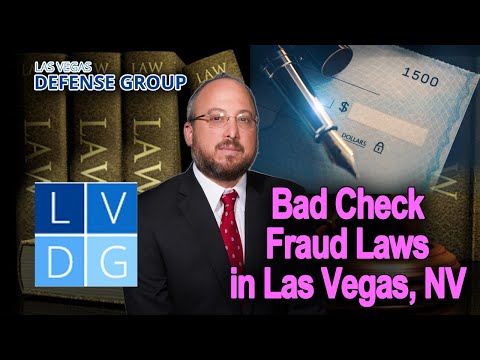
NRS § 205.130 is the Nevada statute that prohibits fraudulent activity as to checks. Passing a bad check is generally prosecuted as a misdemeanor if the amount is less than $1,200.00, and a felony if the amount is $1,200 or greater.
Moreover, in Nevada, unpaid casino markers are treated the same as bad checks.
Below our Las Vegas criminal defense attorneys answer frequently asked questions:
1. What is check fraud in Nevada?
Check fraud is deliberately passing a check with insufficient money in the bank account. In Nevada, courts presume you have intent to defraud once the checks bounce.
So whereas you are normally presumed innocent, if you face check fraud charges, you are essentially presumed guilty. Though there may be ways to rebut this presumption.1

Failing to pay back casino markers violates NRS 205.130.
2. What are the defenses?
Potential bad check defenses include:
- Your identity was stolen;
- You paid in full within 5 days; or
- You were incapacitated
The Clark County D.A.’s Bad Check Department prosecutes bad check cases in Las Vegas.
2.1. Someone else wrote the check
Checks are easy to steal, and signatures are simple to forge. An expert witness who specializes in counterfeits and forgeries may be able to show how someone other than you passed the bad check.
The prosecution should drop the charges if the defense attorney can show that you were an identity theft victim.
2.2. You paid within five days
If you make good on bounced checks within five days of being notified, you are no longer presumed to have intent to defraud. So if the defense attorney can show records that you paid within this grace period, the check fraud charges may be dismissed.2
In casino marker cases, casinos usually give marker-holders 10 days’ notice before filing a criminal complaint.
2.3. You were incapacitated
Emergency situations such as being in the hospital do not automatically let you off the hook for check fraud. Though it weakens the presumption that you had an intent to defraud.
If the defense attorney can show that you were ill or indisposed at the time the check bounced, it may act as leverage when negotiating a plea bargain.
3. What are the penalties under NRS 205.130?
Check fraud punishments depend on the check amount.
|
Nevada check amount |
Penalties for non-payment |
| Less than $1,200 | Misdemeanor:
|
| $1,200 or higher | Category B felony:
|
Traditionally, Nevada D.A.s are willing to dismiss bad check cases if you pay back the money. In some cases, they will set up monthly payment plans.
4. Can I get the record sealed?
Yes. Dismissed charges can get sealed right away. Though convictions must remain on your record for a period of time before being sealed. The length of this wait depends on the conviction:
|
Bad check crime in Nevada |
Record seal wait-time |
| Category D felony | 5 years after the case ends |
| Gross misdemeanor | 2 years after the case ends |
| Misdemeanor | 1 year after the case ends |
| Dismissal (no conviction) | Immediately.4 |
Learn about how to seal Nevada criminal records.
5. What are the immigration consequences?
Check fraud is a crime involving moral turpitude because of the intent to defraud element. Consequently, trying to pass a bad check is deportable.
Non-citizen defendants should consult with an attorney right away about fighting the charges. As discussed above, it may be possible to get NRS 205.130 charges completely dismissed. A dismissal may be the only way to avoid immigration court.
Arrested in California? Go to our page on Penal Code 476a PC.
Arrested in Colorado? Go to our page on CRS 18-5-512.
Legal References
- NRS 205.130. The language of the statute reads as follows:
1. Except as otherwise provided in this subsection and subsections 2 and 3, a person who willfully, with an intent to defraud, draws or passes a check or draft to obtain:
(a) Money;
(b) Delivery of other valuable property;
(c) Services;
(d) The use of property; or
(e) Credit extended by any licensed gaming establishment,
drawn upon any real or fictitious person, bank, firm, partnership, corporation or depositary, when the person has insufficient money, property or credit with the drawee of the instrument to pay it in full upon its presentation, is guilty of a misdemeanor. If that instrument, or a series of instruments passed in the State during a period of 90 days, is in the amount of $1,200 or more, the person is guilty of a category D felony and shall be punished as provided in NRS 193.130. In addition to any other penalty, the court shall order the person to pay restitution.
2. A person who was previously convicted three times of a misdemeanor under the provisions of this section, or of an offense of a similar nature, in this State or any other state, or in a federal jurisdiction, who violates this section is guilty of a category D felony and shall be punished as provided in NRS 193.130. In addition to any other penalty, the court shall order the person to pay restitution.
3. A person who willfully issues any check or draft for the payment of wages in excess of $1,200, when the person knows he or she has insufficient money or credit with the drawee of the instrument to pay the instrument in full upon presentation is guilty of a gross misdemeanor.
4. For the purposes of this section, “credit” means an arrangement or understanding with a person, firm, corporation, bank or depositary for the payment of a check or other instrument.
- NRS 205.132.
- NRS 205.130.
- NRS 179.245; NRS 179.255.
- I.N.A. § 237(a)(2)(A)(i).)

